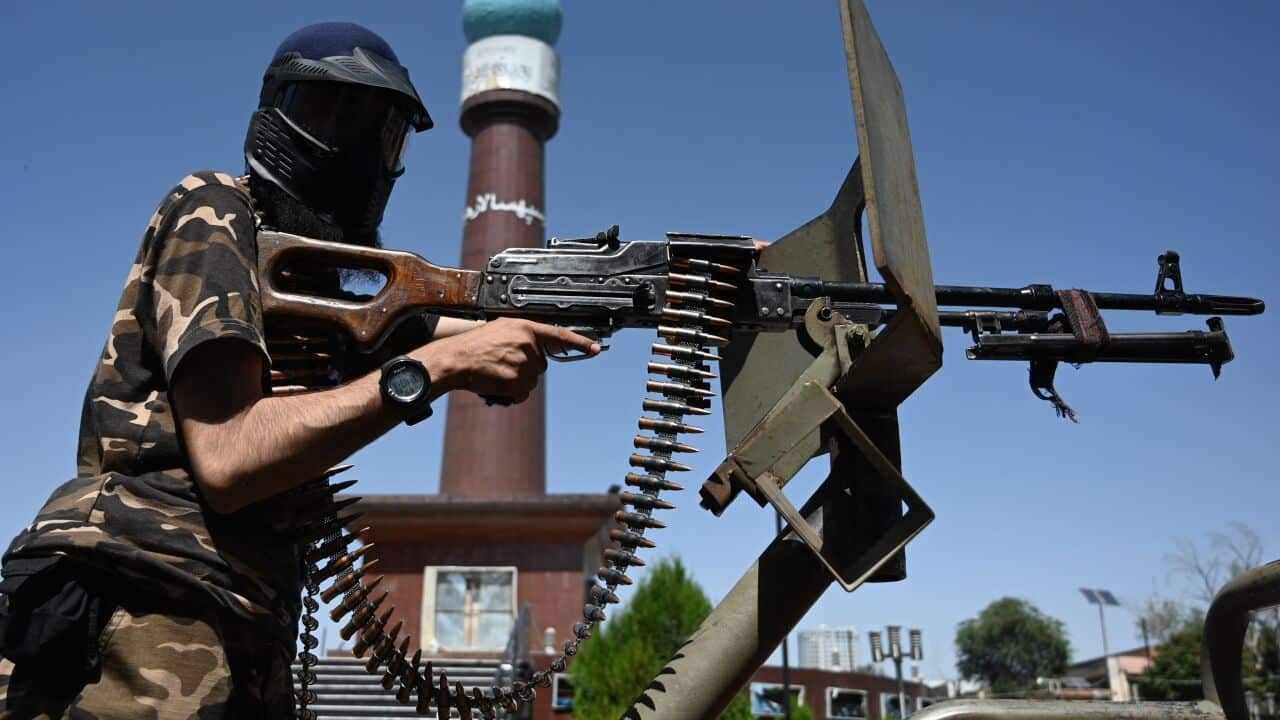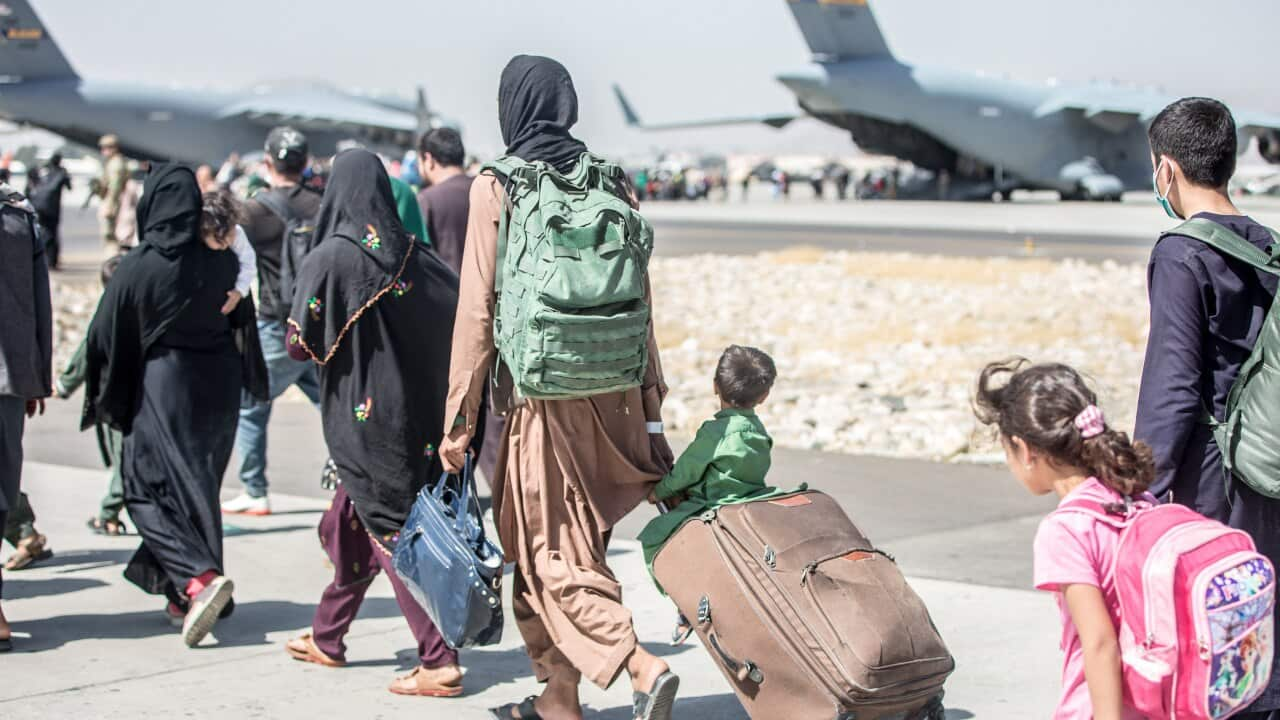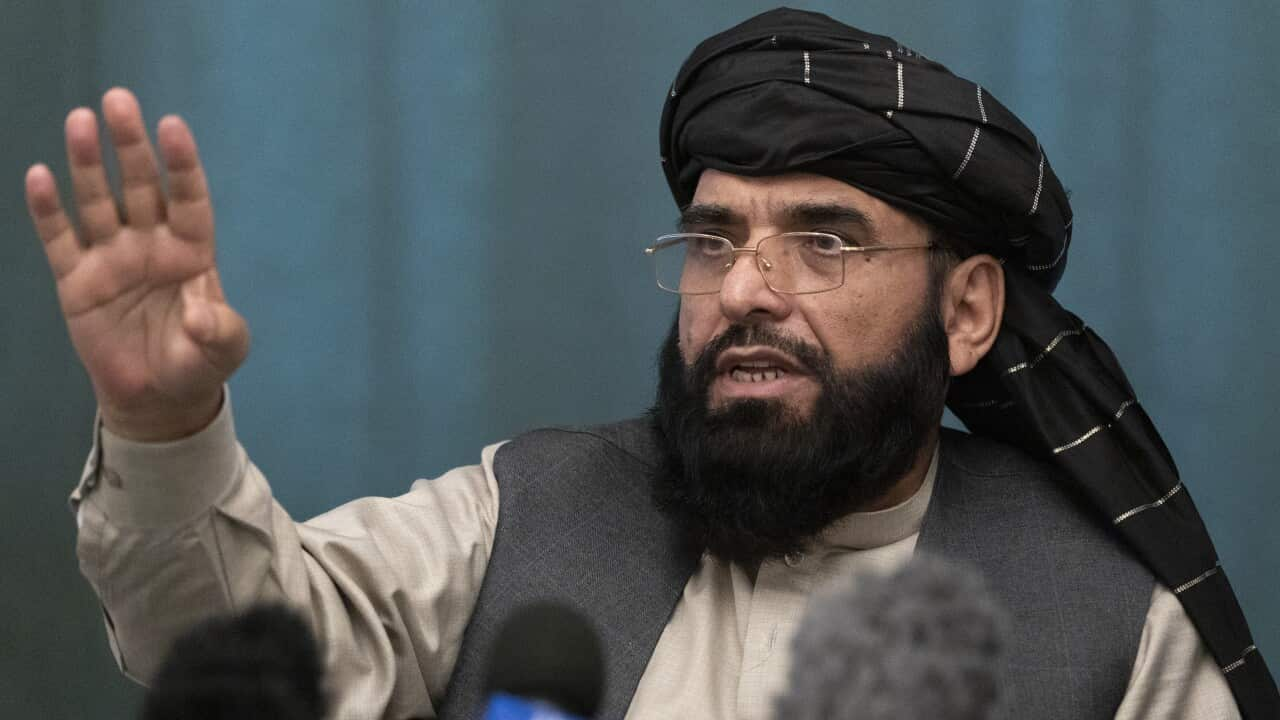Highlights
- There are only a few hundred Sikhs and Hindus remaining in Afghanistan, SBS Pashto understands.
- United Nations human rights chief Michelle Bachelet in August warned that "Afghanistan's diverse ethnic and religious minorities are at risk".
- Afghan Sikh families in Australia say they are willing to help those caught up in Afghanistan.
SBS Pashto understands there are only a few hundred Sikhs and Hindus remaining in Afghanistan, primarily located in the cities of Kabul, Jalalabad, Ghazni and Kandahar.
Hundreds from these religious groups have fled the country since the Taliban takeover in mid-August, including some 67 who boarded an Indian evacuation flight out of Kabul before the final US plane left the city’s airport.
Gurpreet*, a prominent member of Kabul’s Sikh community who requested to withhold his identity, tells SBS Pashto he’s witnessed the dramatic decline in numbers since the early 1990s when there were around 60,000 in the country.
The exodus has gained momentum since the Taliban gained control, he says, including members of his own family who sought refuge in India.
He hopes to join them and plans to then apply for asylum in either the UK, Canada or Australia.
“Half of the families are here [in Afghanistan] and half are there [in India]. I am here but I have sent my family and children to Delhi, and they are definitely concerned about me,” he says.
“I have to go [to India] and reunite with them because there is no life without my wife and children.”
An attack by IS gunmen in March 2020 at the Gurudwara Har Rai Sahib Sikh temple in Kabul killed 25 worshippers including a child, and saw a huge number of Sikh and Hindu families leave the country, Gurpreet explains. The small number that remains hold “grave fears” for their safety.
The small number that remains hold “grave fears” for their safety.

Gunmen stormed a religious gathering of Afghanistan's minority Sikhs in their place of worship. Source: AP
“Not only us but all the people in Afghanistan are concerned, no one knows what is going to happen in the next 30 minutes, one hour or one day.
“I am 60 years old, and I haven’t seen anything else in Afghanistan but war. Everyone wants a peaceful life, even if it’s for five days.
I may live for another 10 years and if I could live those 10 years peacefully, I thank God for that.
In late August, the United Nations human rights chief, that "Afghanistan's diverse ethnic and religious minorities are at risk of violence and repression" given the Taliban's history and reports of targeted killings.
A month earlier, Amnesty International said
Amnesty International Australia campaigner Nikita White tells SBS Pashto Afghan Sikhs and Hindus are “minority groups which could be extremely vulnerable” in Afghanistan.
“Amnesty International’s most immediate concern is for the thousands of Afghans currently at serious risk of Taliban reprisals - including members of religious ethnic minorities such as the Sikh and Hindu community, and academics and journalists, civil society activists and women human rights defenders," she says.
“In recent years, the Sikh and Hindu communities in Afghanistan have come under increasing attack from armed groups, including the horrifying massacre of 25 Sikhs at a temple in Kabul in March 2020.”
Ms White says in July, Amnesty wrote to the High Commissioner for Human Rights and called for a Fact-Finding Mission to be set up to investigate these attacks and the systematic discrimination of the Hazara-Shia and the Sikh communities that amount to violations and abuses of international human rights law and international humanitarian law.
“The brutal killings likely represent a tiny fraction of the total death toll inflicted by the Taliban to date, as the group has cut mobile phone service in many of the areas they have recently captured, controlling what is shared from these regions."
'The Australian government should rescue all minorities ASAP'
Chairperson of Australian Sikh Association Limited (ASAL) Ravinderjit Singh says his group has not been able to establish links with stranded Sikhs and Hindus in Afghanistan “but we are aware of the circumstances they would be in, based on what has been on the TV screens and news for last few weeks”.
“With Taliban in control, we can imagine how minorities will be living in fear and oppression.”
He's calling on the Australian government to prioritise Sikhs in its humanitarian intake of 3000 Afghan nationals, .
“We will do anything that is needed for their rescue from Kabul and other parts of Afghanistan. Once the stranded people are located and identified, we can take up their cases with the federal government and the minister of immigration.
“The Australian government should rescue all minorities ASAP who feel persecuted and living in danger risking their lives in chaotic Afghanistan.
These people have learned to live through hard times, and I am sure once they come to Australia they will work hard to contribute towards the success of Australia as per the tradition of migrants who built up this country.
Support from Australian Afghans
Afghan Sikh community member in Melbourne Preet Singh left Afghanistan 20 years ago when the Taliban was last in power.
Knowing the harsh realities of living under the fundamentalist group, he knows what may lay ahead for those who remain.
“We are very concerned about those who have remained [in Afghanistan], it doesn’t make a difference if they are Hindus, Muslims or Sikhs,” he says.
“All of the people are in fear and facing threats, but our people can be identified from a distance, that’s why we are in more danger, and we are worried about what will happen.
“The rest of them are at risk and they want to reach a safe place as soon as possible.”
Mr Singh says between 15 to 20 Afghan Sikh families in Australia wish to support those who are still in Afghanistan.
“We come together, and we want the government of Australia to help us. So, we can support those families who have remained there [in Afghanistan] and bring them here to Australia.
“We want the government of Australia to bring them as soon as possible to Australia.”
* Name withheld on request due to safety concerns.





